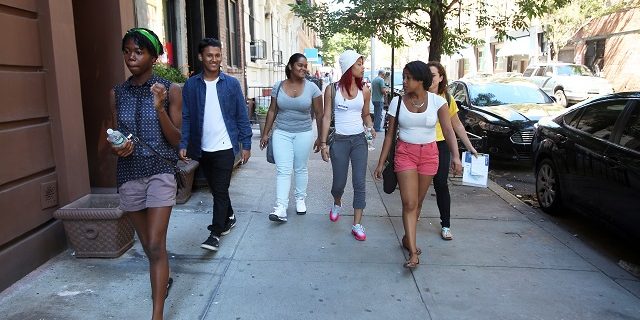
MAPSCorps is a non-profit organization based in Chicago that works with community partners to “train youth to produce high quality data about community assets that everyone can use to improve the human condition.” The Mount Sinai Adolescent Health Center is one of MAPSCorps’ community partners in New York City.
The rate of diabetes in New York City has increased almost 50 percent since 2002, according to the New York City Department of Health. More and more young people are being diagnosed with diabetes or prediabetes. Researchers have said we are living in a “diabetes epidemic.”
There is increasing recognition that preventing and treating diabetes (and promoting overall health and wellness) needs to involve more than just hospitals. Health is about where you live, what grocery stores you have access to, whether it’s safe to play in the park, and even whether you’ve been through trauma. This means that addressing diabetes in Brooklyn will need to involve not just hospitals and health organizations, but the whole community.
This summer I worked as a field coordinator with MAPSCorps and their community partner Mount Sinai Adolescent Health Center, analyzing data on community assets that high school students collected last year. Focusing on Brooklyn, I saw both how the community has responded to the diabetes epidemic, and also the resources still needed to effectively combat this serious disease.
Diabetes affects how your body uses glucose (or blood sugar). When someone has diabetes, their body either can’t make the hormone insulin (type 1 diabetes) or their body doesn’t respond to insulin in the way it should (type 2 diabetes). Insulin is important because it helps glucose leave the blood stream and enter the body’s cells, where it’s used for energy. People with diabetes have high blood sugar, which isn’t good for your body and requires long-term management. Having diabetes puts you at increased risk for heart disease, stroke, vision loss and kidney failure.
While the chances of someone getting diabetes is influenced by genetics, type 2 diabetes is also strongly influenced by your lifestyle. This means that what you eat and how much you exercise can affect whether you get type 2 diabetes. While it’s still more common among older adults, more and more young people are being diagnosed with type 2 diabetes. This is at least partly because young people are less physically active, are eating more unhealthy foods and more likely to be obese than they used to be. 40 percent of elementary school children are overweight, which is a risk factor for developing diabetes.
In Brooklyn, several hospitals such as New York Presbyterian Hospital, Interfaith Medical Center and Brookdale Medical Center, have included the prevention of chronic diseases like diabetes in their community service plans. NewYork-Presbyterian Brooklyn Methodist Hospital runs the Brooklyn Diabetes Education and Resource Center, and other resources include The Brooklyn Hospital Center and Brooklyn Diabetes and Eye Center, all of which provide more comprehensive care.
But preventing diabetes and caring for diabetes patients require resources that go beyond the medical. Young people need access to health care, places they can exercise, health education, access to nutritious food, and help dealing with stress. While the Mount Sinai Adolescent Health Center in Manhattan provides free, comprehensive health and wellness education to young people, Brooklynites shouldn’t have to leave their own neighborhoods for the care they need.
While more community services are needed to adequately address diabetes, individuals can still take action. Try these practices for healthy living to prevent diabetes:
- Aim for an hour of physical activity every day, but keep in mind that even 10-30 minutes is way better than nothing.
- Eat nutritious meals full of fruits and vegetables.
- See your doctor regularly, even when you’re not sick!
- If you drink alcohol, limit how much you drink (or stop entirely!)
- Don’t smoke.
The Mount Sinai Adolescent Health Center is located in New York City. It provides comprehensive, confidential, judgment free health care at no charge to over 10,000 young people every year. This column is not intended to provide medical advice, professional diagnosis, opinion, treatment or services to you or to any other individual, only general information for education purposes only.


